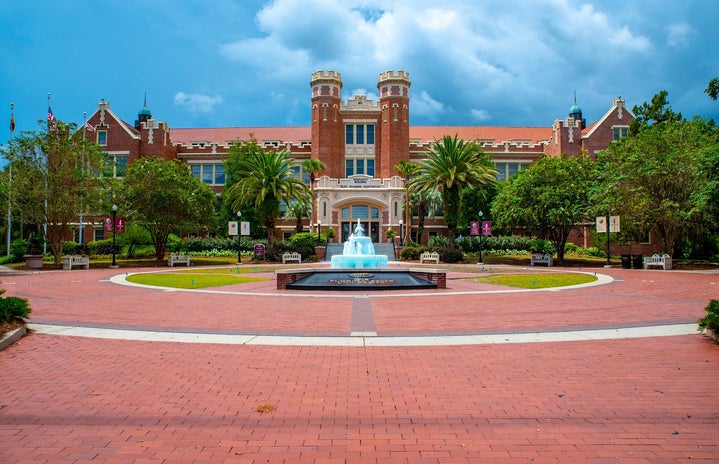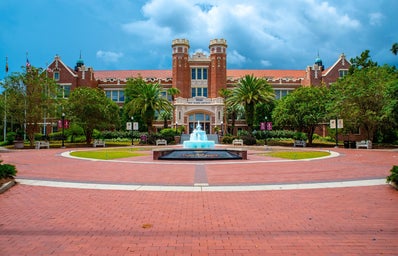What makes a great leader? Several things. Leaders have many qualities and characteristics that shape them. One of those qualities is the ability to be a voice for those who follow you. Ashley Gonzalez Ferraro is just that: a voice. A loud one. A brilliant one. Ashley is a force on FSU’s campus and in FSU SGA. She’s standing up and advocating for all the communities and all the students that aren’t being heard on campus. Originally from New York City, Ashley moved to Orlando in middle school. She’s double majoring in Criminology and International Affairs and (like the rest of us) is obsessed with Hamilton.
Her Campus (HC): How did you get involved in SGA? Why?
Ashley Gonzalez Ferraro (AGF): My first experience with SGA at FSU was the Seminole Minority Leadership Institute with the Black Student Union. Current Vice President, Janvier, was the Lead Facilitator of the institute, and she taught me how to navigate Florida State as a woman of color. She prepared me with the necessary skills and lessons to be able to adequately represent and advocate for the communities and constituents I’m tasked with representing within my Senate Seat. Ultimately, SBVP Janvier was also the individual who presented me with the opportunity to be a Student Senator directly after the conclusion of the institute. Within the institute, a common theme we discovered was the true lack of voice for people like me within Student Government, so acknowledging that gap and the opportunity, it was a no brainer for me.
HC: What are some of the roles/positions that you hold in SGA (past and present)?
AGF: As I’ve alluded to, my main position within SGA is as a Student Senator for the College of Social Science and Public Policy. Within Senate, I’m Chair of the Oversight Committee, Vice-Chair of the Racial Inclusivity and Justice Ad Hoc and Liaison for both the Black Student Union and the Veterans Student Union. Agency work is a very big part of who I am, what I do and how to adequately represent and understand identity-based communities so I’m also a Programming Coordinator for the Hispanic Latinx Student Union.
HC: You are a voice and a leader for a lot of students on this campus. Do you see yourself that way?
AGF: I’m honored that you think of me that way but if someone would have told me that I would be thought of in that light less than a year ago, I would have doubted it. A big part of me joining SGA was to provide a voice for the communities I believed were voiceless in Senate and within a predominantly white institution. That was my initial goal and throughout all, still prevails as my goal. I see myself as someone who tries their hardest to bring individuals to a table, to further the development and advancement of the student body. I want my voice to echo and embody those of the Hispanic Latinx, Black, First Generation and CARE communities. Sometimes, it does involve being a leader, but most of the time, it’s just about bringing people to a table and listening.
HC: Why is it important, to you, to be a voice and leader for your fellow classmates?
AGF: We’re living through a frame in history and society where being silent and allied isn’t enough. Our generation has welcomed a new age of learning, understanding, selflessness, humility and courage that has never been witnessed before. With this new age comes not only the belief but the need, to be loud and fierce for dismantling and reforming systems that aren’t made to benefit the historical underdog. This age of progression calls for individuals to be that voice and bring that leadership to spaces that aren’t welcoming or appreciative of it. I know I have a lot to say and I know there’s a call for my voice to be represented, so it’s important for me to answer that large-scale and individual-scale call for leadership.
HC: Where does your dedication to leading and advocating for your classmates come from?
AGF: It would be remiss of me not to acknowledge why our generation is the generation of progression. I grew up watching the first Black President be elected, I had just turned seven years old. I grew up to see him be re-elected for a second term, I was 11 years old. I also vividly recall watching Trayvon Martin be killed by Zimmerman and watching the trial play out, I was also 11 years old. These are just individual instances but they paint a bigger picture of catalysts conflating to mold a generation who has seen historical representation and advancement but also witnessed the severe consequences of systems of oppression, at our doorstep here in Florida. My dedication to leading and advocating for my classmates comes from them and my belief in their voices, their advocacy and the value in their lives.
HC: How have you used your time in SGA to advocate for different communities on and off-campus?
AGF: If we were to truly analyze the power the Student Senate holds, it’s not very extensive. Besides the yearly allocation of $13 million dollars, there’s not much beyond that. For me, it’s been more of realizing that just holding the position, gives me the ability to use my capacity to sit in rooms and tables and even create tables for others to sit in. I have used my time in SGA to create those tables, those conversations that may not result in something tactile but touch different parts of campus and encourage others to begin their own conversations. The revolution doesn’t happen overnight.
HC: What have you learned from being in SGA?
AGF: I have learned that being in politics is tough, draining and special. I have learned that not everyone is in it for the same reasons I am. I’ve also understood that it’s also not an individual person’s fault. The political environment breeds selfishness, conflict and polarization because of how close to home some issues hit but also because of the hopes for individual political advancement, which is not inherently bad. I have learned how to meet people halfway and be receptive. However, I have also learned how to stand firm in what I believe in, regardless of whether it can result in conflict or not. It’s taught me character, empathy and resolution.
HC: How can we make FSU a better place/community for all students?
AGF: I believe the beginning of all conflicts resulting from differing opinions begins with a lack of empathy and humanity. If we truly thought of that individual as someone who you love with your whole heart, there would be a lot less fighting. Empathy and humanity provide a space for understanding, receptiveness and growth. It doesn’t matter whether you inherently differ in opinion because if the foundation of that relationship is cherishing and empathetic, there would be no room for disrespect or devaluing.
HC: If you were given a microphone and asked to say something, (anything) to the student body, what would you say?
AGF: It is bigger than you as an individual. Remove yourself from the echo chambers you live in and place yourself in a space of disagreement, with empathy as your leading force. The flaw in humanity is individualism, as we move away from the self, we will realize the true power in collectivism.
Want to see more HCFSU? Be sure to like us on Facebook and follow us on Instagram, Twitter and Pinterest!




